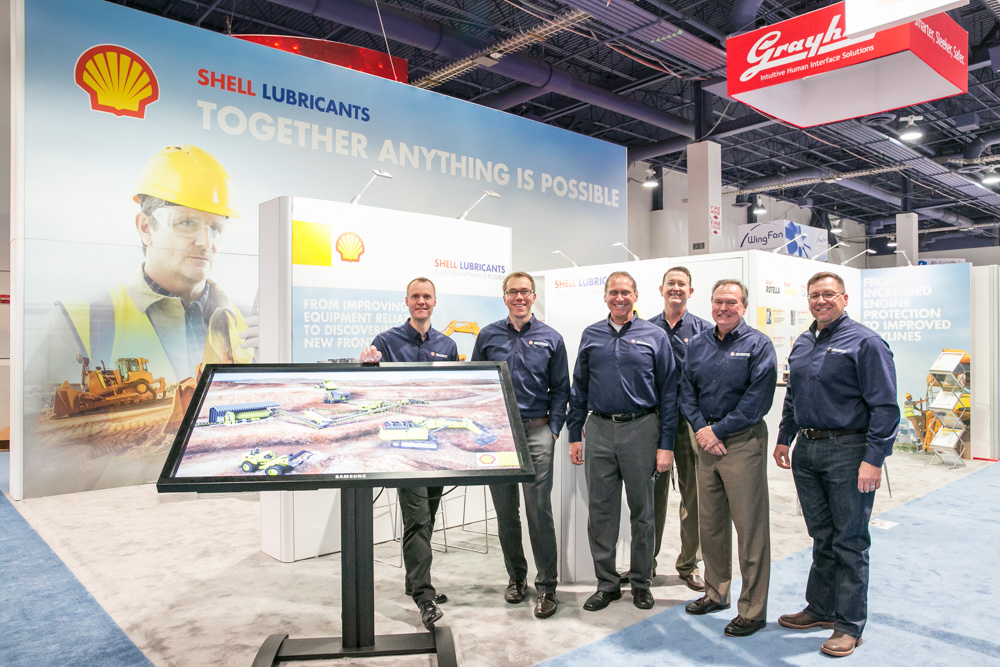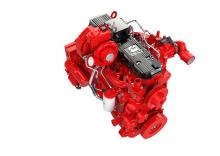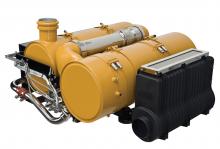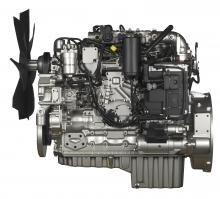CONEXPO-CON/AGG was a chance for Shell Lubricants to showcase its new portfolio of Shell Rotella heavy duty diesel engine oils. They meet Environmental Protection Agency (EPA) regulations which came into force on 1 December last year. For fleet operators, the changes mean less frequent maintenance stops and improved fuel efficiency.
The EPA, working with oil marketers, engine manufacturers and chemical companies has been developing new oil standards, which currently apply to on-road vehicles. In creating

Shell’s Dan Arcy lead the development of new heavy duty engine oil categories
CONEXPO-CON/AGG was a chance for 763 Shell Lubricants to showcase its new portfolio of Shell Rotella heavy duty diesel engine oils. They meet Environmental Protection Agency (EPA) regulations which came into force on 1 December last year. For fleet operators, the changes mean less frequent maintenance stops and improved fuel efficiency.
The EPA, working with oil marketers, engine manufacturers and chemical companies has been developing new oil standards, which currently apply to on-road vehicles. In creating the new standards, a process which began in 2011, the aim was to improve oxidation control, aeration control and shear stability – as well as tackling fuel economy and emissions.
Category CJ-4 oil has now been replaced with categories CK-4 and FA-4. CK-4 has the same viscosity grade as its predecessor and can be used in all existing engines. FA-4 has a lower viscosity, delivering fuel efficiency and reduced CO2 emissions, and can be used in engines built from 2017 onwards – as well as some existing ones.
“Legislation introduced in January 2017 requires a reduction in CO2 emissions for highway applications, which is the reason for the introduction of FA-4,” explained Dan Arcy, Shell’s global OEM technical manager, and the chair of the EPA committee that oversaw the creation of the new categories.
Using CK-4 rather than CJ-4 will lead to reduced maintenance, said Arcy. The standard drain intervals will lengthen significantly whatever the make of engine.
Shell started developing its new oils in 2013 and can boast over 50 million miles of testing time since then. “Some people were worried about the lower viscosity oil and how it would impact on the engines,” said Arcy. “By carrying out this extensive testing we were able to demonstrate that the wear is the same.”
Initially, companies with on- and off-road vehicles will opt for the CK-4 category oils. “None of the off-highway manufacturers are supporting the use of FA-4 at the moment but I think that will change,” said Arcy. “If you look at emissions standards, highways lead the way and then off-highway follows on four to six years later.”
Europe is expected to follow the US’s lead with the introduction of a similar category to FA-4, expected in 2018.
The EPA, working with oil marketers, engine manufacturers and chemical companies has been developing new oil standards, which currently apply to on-road vehicles. In creating the new standards, a process which began in 2011, the aim was to improve oxidation control, aeration control and shear stability – as well as tackling fuel economy and emissions.
Category CJ-4 oil has now been replaced with categories CK-4 and FA-4. CK-4 has the same viscosity grade as its predecessor and can be used in all existing engines. FA-4 has a lower viscosity, delivering fuel efficiency and reduced CO2 emissions, and can be used in engines built from 2017 onwards – as well as some existing ones.
“Legislation introduced in January 2017 requires a reduction in CO2 emissions for highway applications, which is the reason for the introduction of FA-4,” explained Dan Arcy, Shell’s global OEM technical manager, and the chair of the EPA committee that oversaw the creation of the new categories.
Using CK-4 rather than CJ-4 will lead to reduced maintenance, said Arcy. The standard drain intervals will lengthen significantly whatever the make of engine.
Shell started developing its new oils in 2013 and can boast over 50 million miles of testing time since then. “Some people were worried about the lower viscosity oil and how it would impact on the engines,” said Arcy. “By carrying out this extensive testing we were able to demonstrate that the wear is the same.”
Initially, companies with on- and off-road vehicles will opt for the CK-4 category oils. “None of the off-highway manufacturers are supporting the use of FA-4 at the moment but I think that will change,” said Arcy. “If you look at emissions standards, highways lead the way and then off-highway follows on four to six years later.”
Europe is expected to follow the US’s lead with the introduction of a similar category to FA-4, expected in 2018.









